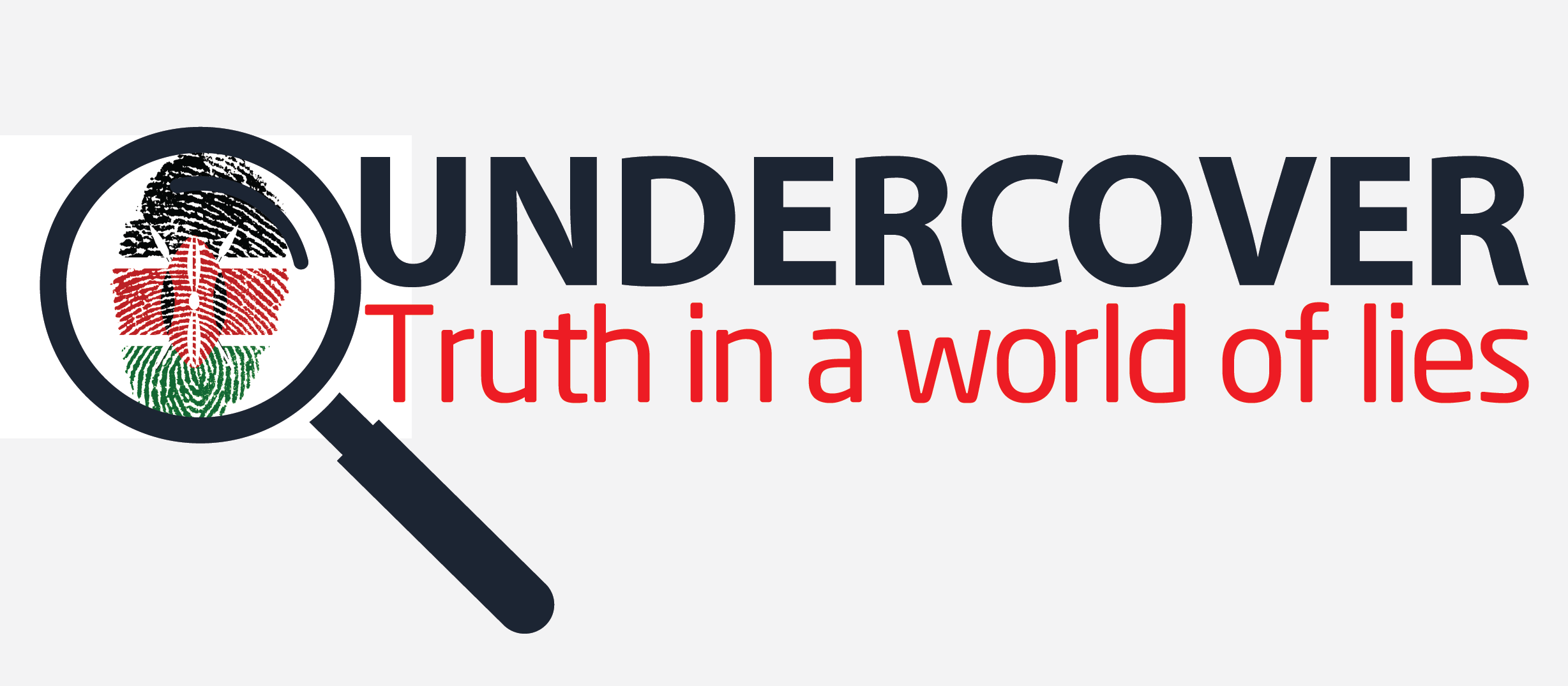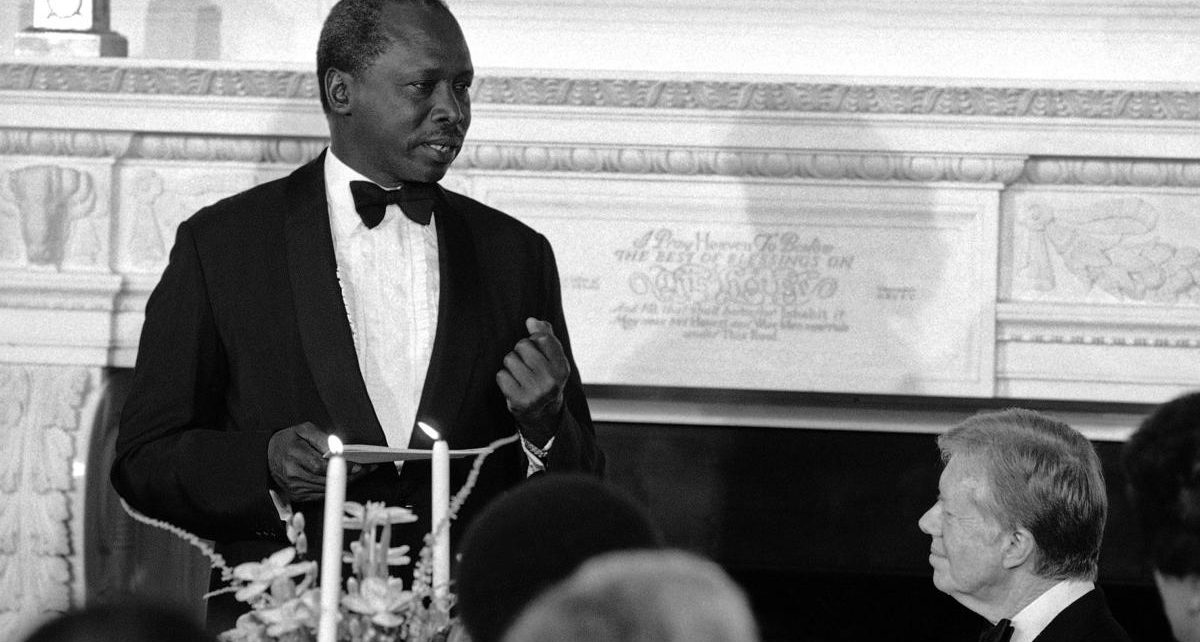Moi was a contradiction: He ran a beer distributorship, but never cut a drop. He fought to protect elephants, but carried an ivory rungu
By Undercover Reporter
@Undercover KE
In the high school soccer team, he was nicknamed ‘wheelbarrow’ for his skills in defense. At the Nairobi Hospital where he died aged 95, medics had codenamed retired President Daniel arap Moi ‘Dab-Dab.’
Though Kenyans were told he died in the early hours of Tuesday, February 4, 2020, ‘Dab-Dab’ might have died much earlier. Medically kaput since January, it was a tube through the neck which kept doctors and nurses busy, every now and then calling over their phones to check on ‘Dab-Dab.’
The man whose family was blessed with longevity died five years short of a century.
Stripped down to his bare essentials, Moi, in his 95 years, was a contradiction: Bible quoting family man who never failed to attend church most Sundays on one hand, and a ruthless dictator who crushed his political opponents in ways the bible would have disapproved.
A staunch Christian who kept grudges and lived long enough to accomplish them.
He loved children, but hated his own. Financially generous even to strangers, but mean to his six children- except two- Gideon and June Moi.
He had a beer distributorship, but never cut a drop. He fought to protect elephants, but carried an ivory rungu as his symbol of authority and power.
He gave the illusion of favouring traditional foods but behind the scenes tore into roast goat ribs with carnivorous zeal. He castigated mzungus but his personal doctor, Dr David Silverstein, was not an African.
Moi was a career teacher who had heartburn hanging out with educated folk. He expanded education during his presidency, but detained university students and lecturers.
Moi conserved forests but also dished out huge chunks of forest land to friends, family and political sidekicks.
He was always surrounded by crowds but was essentially without friends, a loner
He advanced the causes of the girl child, especially in education, but was uneasy around women and thought men who loved their mothers were weak-like his son, the late Jonathan Toroitich.
He was always surrounded by crowds but was essentially without friends, a loner. A Kalenjin, he loved soccer, Gor Mahia FC to be precise, and not athletics for which his community is genetically gifted.
Moi preached against ukabila, but the Kalenjinization of Kenya saw his community populating all levels of government and disciplined forces where their mother tongue became the Lingua Franca in the civil service- for Moi hated spoken English!
The Nyayo philosophy was peace, love and unity, but ethnically instigated land clashes brought no peace, love and unity to victims.
He was humble, but loved praise songs, sycophantic toadies and grandiose monuments in his honour.
But President Daniel arap Moi had no contradictions when it came to his tribal roots.
He carried a rungu, just like he did – as a Kalenjin boy- for protection in his callow youth.
As a Kalenjin man of the blood, he was patriarchal in whose hierarchy women, children and cattle are grouped the same. There were no public displays of affection with his wife, he was rarely seen in public with his daughters. His children rarely visited his government office. Even when he was President, Head of Civil Service Dr Sally Kosgey never saw any of them dropping by to see daddy.
Unromantic as a Kalenjin man of his colonial generation, there was no First Lady at State House and he was ever uneasy around women-unless it was his adopted daughter, June Moi, his major female confidant and future business proxy.
British Prime Minister Margaret Thatcher came to Kenya and in her memoirs thought Moi, though blessed with the charisma of a maize cob, was the kind of man a woman wouldn’t mind taking to her mother.
During New Year State Balls at the Mombasa State House, he preferred dancing alone and avoided women who tried inching their high heels towards him.
Dancing actually sealed his separation to the mother of his seven children, one adopted. Lena Moi thought dancing was unchristian and evil.
Like her hubby, her puritanical nature was influenced by the African Inland Missionaries, especially the family of Rev Alfred Barnett, who pitched tent in Baringo from their native Australia-the country founded by convicts and prostitutes.
Lena later wished Moi, nicknamed ‘Kapkorios’ for his big head, never got into politics
It was Alfred’s son Paul who baptized Helena Bomet, Moi’s future wife while Erick Barnett presided over their wedding in 1950. Like Moi, Lena was a teacher, the best, most respected profession at the time.
They were doing well. Moi had been promoted to a headmaster. They lived in a wooden house while all around them were thatch roof mud walled huts. The wooden house, where they were blessed with their first three children is still there.
Lena later wished Moi, nicknamed ‘Kapkorios’ for his big head, never got into politics.
It got him away from his young family for long periods. When he was appointed Vice President in 1967, things only got bad.
Lena, shy and all, was meant to preside over state affairs like the wife of Vice President. She only managed one public function; welcoming Muriel Humphrey Brown, wife of US Vice President Hubert Humphrey at the Embakasi Airport in Nairobi in 1968. Tongue lashing on Mzee Jomo Kenyatta after he requested for a dance at the Rift Valley Technical Institute was the straw that broke Moi’s back in marriage in 1974.
Lena was banished to their home in Kabimoi where she was accompanied by her eldest son, Jonathan. Moi had to be helped by military aides to discipline his children, especially Philip, a kichwa ngumu to the end. Their divorce was finalized in 1979, a year after he became president.
Politically, there were other vichwa ngumus in government who ensured he had sleepless nights as Vice President: Rift Valley PC Isaiah Mathenge who spoke Kikuyu in his presence throughout many meetings. Mathenge’s daughter Catherine was married to Kenyatta’s nephew, Ngengi Muigai.
Besides being slapped by Rift Valley Police boss James Mungai who often engaged Moi in physical miereka at State House Nakuru as Kenyatta watched, Moi also endured madharau of different shades: Like driving himself to the airport to pick dignitaries in the dead of night and without security!
For 11 years, Moi was cold-shouldered and demeaned by hirelings in the Kenyatta administration. Coast politician Ronald Ngala often wondered aloud why he allowed himself to be treated like a doormat and he retorted: “Take it easy, our time will come.”
When that time came after Kenyatta’s death on August 22, 1978, his enemies, real and imagined later cried in the toilet.
Moi, the staunch Christian, saw through to all his grudges.
His greatest strength, revealed British biographer Andrew Morton in his 1999 memoirs, Moi: The Making of an African Statesman, was his patience; a capacity to shrewdly judge character, observe the political scene with marked disinterest, then act unexpectedly. “I know them all, I know what makes them work” he would say of his enemies and as many realized “he was not a man to play poker against” observed his personal physician Dr David Silverstein of Moi’ political style-patient, calculated, sudden, bloodless.
President Moi’s rule was defined by two major events: the attempted military coup of August 1, 1982 and the fall of communism in 1989.
The coup, though unfortunate, was a blessing in disguise. It allowed him to neutralize those who had humiliated him using the presidency, parliament and the judiciary.
As an ardent reader of Italian political strategist Niccolo Machiavelli’s The Prince, Moi destroyed those who made him; Attorney General Charles Njonjo, the kingmaker who singled him out for the Vice President’s job, had his political balloon blown before it was pricked via a Commission of Inquiry in 1984.
The military and the police were Kalenjinized. Incompetence was a virtue
Fear was made a tool of governance as Kenya became a Police State. There were torture chambers at Nyayo House in Nairobi for dissidents. The coup of 1982 was triggered by among others; Kenya being turned into a single party state.
That never changed. Kanu, the political party, was Baba na Mama. And there was the Kanu Disciplinary Committee that made grown men with parental hair on their chest pee into their boots. Being expelled from Kanu was the end of one’s political career.
The military and the police were Kalenjinized. Incompetence was a virtue. Justice was bought and the Budget and foreign aid could disappear and be replaced with more foreign loans.
Nothing worked in government although Kenyans felt Moi everywhere: on currency notes and mandatory portraits. His name was on streets, schools, stadiums, university, airport, and monuments.
At the time, the Cold War which had been waged since the 1960s by America and Russia, the two world super powers ended in 1989 with the collapse of the Berlin Wall that separated the democratic West and communist East Berlin in Germany. It marked the end of Communism as a political ideology fell and Russia as a super power. Communist dictators began being overthrown all around the world.
Two year later, Moi allowed multiparty democracy, but a divided Opposition handed him the presidency when elections were held in 1992. He remained the omnipresent president. He was the news and news bulletin were about him so much so that when he was kept under house arrest by his doctor in 1996, Kenyans withdrew their children from schools, skived from work and rushed to shops stocking on home supplies.
Winning elections called for massive looting of public coffers to bribe voters and buy politicians besides using assassinations as a tool of political management.
The other side of his roots also emerged and was encapsulated by his henchmen from his community. Kalenjins are highland Nilotes to whom pasture is a resource. The government of Kenya as an extractive entity which collects taxes was treated as a pasture. And when one pasture is bare of greenery, a highland Nilote camps in the next. That was how parastatals and other state agencies were chewed to the ground.
The 24 year reign of President Daniel arap Moi ended with his end of his second term in 2002 in which time official corruption, abuse of power, and economic degradation were the hallmarks of his ignoble regime in which time he had no wife at State House to soften him up-even in retirement.
He will be buried in a State Funeral at his Kabarak farm, Nakuru County, on February 12.

